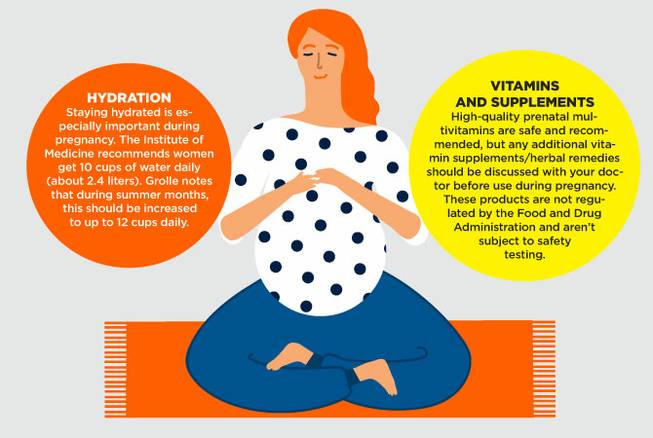
Monday, May 29, 2017 | 2 a.m.
A healthy baby is the goal for mothers-to-be, and as such, a happy pregnancy should also be high priority.
While expectant mothers are tasked with making many important lifestyle changes, a healthful pregnancy does not need to be overly restrictive. “Pregnant women have 40 weeks to make healthy decisions for her baby and herself, and many of the good habits picked up during pregnancy stick around long after delivery,” said Matthew Grolle, MD, OB/GYN at Sunrise Children’s Hospital.
While the topic of pregnancy can be fraught with concerns, following a balanced, intuitive lifestyle can contribute to the overall wellness of both mother and child.
The pillars of pregnancy health
Pregnant women need to be conscious of their health by maintaining a nutritious diet, exercising, getting plenty of sleep and avoiding harmful substances. “The most important lifestyle changes are self-explanatory — be good to yourself!” Grolle said.
For some, this means breaking bad habits: Alcohol, tobacco and drugs should be avoided completely. Even in moderation, these are linked to dangerous complications and serious birth defects.
If you’re struggling to kick a habit, talk to your doctor about addiction treatment options that can help.
Diet
Pregnant women should focus on a well-rounded diet including lean proteins, whole grains, fruits, veggies and healthy fats. However, your changing body may draw its own limits as well.
“Each trimester poses different challenges, and it’s important to keep realistic goals,” Grolle said. “Maintaining a diet rich with fruits and vegetables can be difficult when nausea peaks in the first trimester.”
If you’re unable to eat certain foods, you may need to supplement those nutrients in different ways.
• Important nutrients for pregnancy: Folic acid, iron, calcium, protein
• Foods to limit: Artificial sweeteners, caffeine and fish with high-mercury content such as tuna, swordfish and king mackerel
How much caffeine is safe? The recommended maximum for pregnant women is 200 milligrams of caffeine a day, about a 12-ounce cup of coffee.
• Foods to avoid: Unpasteurized milks, cheeses and juices; processed meats including hot dogs and cold cuts; raw or undercooked seafood, eggs and meat; smoked seafood.
These foods may carry listeria, a bacteria that can cause serious infections in pregnant women and jeopardize the baby’s health. Listeria also can be found on fruits and vegetables that have not been properly washed, so be thorough while preparing meals as well.
Exercise
“Exercise during pregnancy will lower blood pressure, promote healing, help with sleep and fend off gestational diabetes,” Grolle said.
The American College of Obstetricians and Gynecologists recommends that healthy pregnant women get at least 150 minutes of moderate-intensity aerobic activity spread evenly throughout the week.
Women with high-risk pregnancies require different exercise considerations and should strategize with their doctor to create a safe regimen.
• Exercise that should be avoided during pregnancy: Contact sports, hot yoga/other heated workouts, high-weight, low-repetition lifting.
Hydration
Staying hydrated is especially important during pregnancy. The Institute of Medicine recommends women get 10 cups of water daily (about 2.4 liters). Grolle notes that during summer months, this should be increased to up to 12 cups daily.
Over-the-counter medications
Only some OTC medications are safe during pregnancy. “Many of my patients try to avoid medication altogether, however that’s not always possible. Medications like Tylenol and Robitussin have never been shown to have adverse side effects on pregnancy,” Grolle said.
Acetaminophen medications are generally fine, but pregnant women should avoid nonsteroid anti-inflammatory drugs (NSAIDs) — such as ibuprofen — which can damage the baby’s cardiovascular system.
Vitamins and supplements
High-quality prenatal multivitamins are safe and recommended, but any additional vitamin supplements/herbal remedies should be discussed with your doctor before use during pregnancy. These products are not regulated by the Food and Drug Administration and aren’t subject to safety testing.
Cleaning supplies
Keeping surfaces germ-free is smart during pregnancy, but some common household solvents may pose a risk. While the effects of cleaning chemicals on pregnant women have not been clinically studied, Grolle recommends erring on the side of caution.
Clean only in well-ventilated areas while wearing a mask and gloves, and use natural cleansers (such as vinegar, baking soda and hydrogen peroxide) whenever possible.
Personal care products
Skin/hair-care products, makeup, nail polish and other similar products should be re-evaluated during pregnancy.
Anything applied to the skin can reach the bloodstream and circulate to the baby.
While most personal care products undergo general safety testing, there is little research about their effects during pregnancy. “Because some of the chemicals can be so caustic and the research is lacking, I tell my patients to avoid things like hair dye and self-tanner until after pregnancy. I also strongly recommend discontinuing use of any acne products, especially during the first trimester,” Grolle said.
There are plenty of natural alternatives to use while pregnant, so make an informed decision about which products to keep in your rotation and which to replace.
Pets
If you have a pet cat, avoid cleaning the litter box while pregnant. Cat feces can contain a parasite that causes toxoplasmosis, which is a rare but serious illness.

Join the Discussion:
Check this out for a full explanation of our conversion to the LiveFyre commenting system and instructions on how to sign up for an account.
Full comments policy